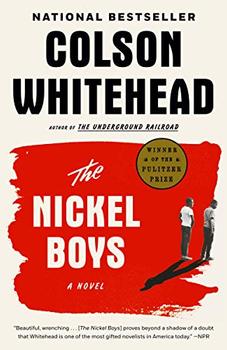Summary | Excerpt | Reading Guide | Reviews | Beyond the Book | Readalikes | Genres & Themes | Author Bio

Excerpt
The Nickel Boys
Elwood received the best gift of his life on Christmas Day 1962, even if the ideas it put it in his head were his undoing. Martin Luther King At Zion Hill was the only album he owned and it never left the turntable. His grandmother Hattie had a few gospel records, which she only played when the world discovered a new mean way to work on her, and Elwood wasn't allowed to listen to the Motown groups or popular songs like that on account of their licentious nature. The rest of his presents that year were clothes – a new red sweater, socks – and he certainly wore those out, but nothing endured such good and constant use as the record. Every scratch and pop it gathered over the months was a mark of his enlightenment, tracking each time he entered into a new understanding of the Reverend's words. The crackle of truth.
They didn't have a TV set but Dr. King's speeches were such a vivid chronicle -- containing all that the Negro had been and all that he would be -- that the record was almost as good as television. Maybe even better, grander, like the towering screen at the Davis Drive-In, which he'd been to twice. Elwood saw it all: Africans persecuted by the white sin of slavery, Negroes humiliated and kept low by segregation, and that luminous image to come, when all those places closed to his race were opened.
The speeches had been recorded all over, Detroit and Charlotte and Montgomery, connecting Elwood to the rights struggle across the country. One speech even made him feel like a member of the King family. Every kid had heard of Fun Town, been there or envied someone who had. In the third cut on Side A, Dr. King spoke of how his daughter longed to visit the amusement park on Stewart Ave in Atlanta. Yolanda begged her parents whenever she spotted the big sign from the expressway or the commercials came on TV. Dr. King had to tell her in his low, sad rumble about the segregation system that kept colored boys and girls on the other side of the fence. Explain the misguided thinking of some whites -- not all whites, but enough whites – that gave it force and meaning. He counseled his daughter to resist the lure of hatred and bitterness and assured her that "Even though you can't go to Fun Town, you are as good as anyone who gets to go to Fun Town."
That was Elwood -- good as anyone. A hundred miles south of Atlanta, in Tallahassee. Sometimes he saw a Fun Town commercial while visiting his cousins in Georgia. Lurching rides and happy music, chipper white kids lining up for the Wild Mouse Roller Coaster, Dick's Mini Golf. Strap into the Atomic Rocket for a Trip to the Moon. A perfect report card guaranteed free admission, the commercials said, if your teacher stamped a red mark on it. Elwood got all A's and kept his stack of evidence for the day they opened Fun Town to all God's children, as Dr. King promised. "I'll get in free every day for a month, easy," he told his grandmother, lying on the front room rug and tracing a threadbare patch with his thumb.
His grandmother Hattie had rescued the rug from the alley behind the Richmond Hotel after the last renovation. The bureau in her room, the tiny table next to Elwood's bed, and three lamps were also Richmond castoffs. Hattie had worked at the hotel since she was fourteen, when she joined her mother on the cleaning staff. Once Elwood entered high school, the hotel manager Mr. Parker made it clear he'd hire him as a porter whenever he wanted, smart kid like him, and the white man was disappointed when the boy began working at Marconi's Tobacco & Cigars. Mr. Parker was always kind to the family, even after he had to fire Elwood's mother for stealing.
Elwood liked the Richmond and he liked Mr. Parker, but adding a fourth generation to the hotel's accounts made him uneasy in a way he found difficult to describe. Even before the encyclopedias. When he was younger, he sat on a crate in the hotel kitchen after school, reading comic books and Hardy Boys while his grandmother straightened and scrubbed upstairs. With both his parents gone, she preferred to have her nine-year-old grandson nearby instead of alone in the house. Seeing Elwood with the kitchen men made her think those afternoons were a kind of school in their own right, that it was good for him to be around men. The cooks and waiters took the boy for a mascot, playing hide and seek with him and peddling creaky wisdom on various topics: the white man's ways, how to treat a good-time gal, strategies for hiding money around the house. Elwood didn't understand what the older men talked about most of the time, but he nodded gamely before returning to his adventure stories.
Excerpted from The Nickel Boys by Colson Whitehead. Copyright © 2019 by Colson Whitehead. All rights reserved. No part of this excerpt may be reproduced or reprinted without permission in writing from the publisher.




A library, to modify the famous metaphor of Socrates, should be the delivery room for the birth of ideas--a place ...
Click Here to find out who said this, as well as discovering other famous literary quotes!
Your guide toexceptional books
BookBrowse seeks out and recommends the best in contemporary fiction and nonfiction—books that not only engage and entertain but also deepen our understanding of ourselves and the world around us.